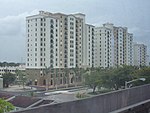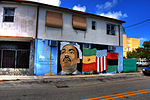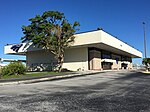Ku Klux Klan raid of La Paloma nightclub
1930s in LGBT history1937 crimes in the United States1937 in Florida20th century in MiamiAttacks on buildings and structures in Florida ... and 9 more
Attacks on buildings and structures in the 1930sAttacks on nightclubs in the United StatesHistory of gay men in the United StatesKu Klux Klan crimesLGBT history in FloridaNovember 1937 eventsRiots and civil disorder in Miami-Dade County, FloridaTerrorist incidents in FloridaTerrorist incidents in the United States in the 1930s
On November 15, 1937 an estimated 200 Ku Klux Klan members stormed the popular LGBT-serving nightclub, La Paloma, in an unincorporated area of Dade County, Florida, ordering patrons to leave and shutting the nightclub down for the evening.
Excerpt from the Wikipedia article Ku Klux Klan raid of La Paloma nightclub (License: CC BY-SA 3.0, Authors).Ku Klux Klan raid of La Paloma nightclub
Northwest 27th Avenue,
Geographical coordinates (GPS) Address Nearby Places Show on map
Geographical coordinates (GPS)
| Latitude | Longitude |
|---|---|
| N 25.8397 ° | E -80.2417 ° |
Address
Northwest 27th Avenue 7226
33147
Florida, United States
Open on Google Maps







